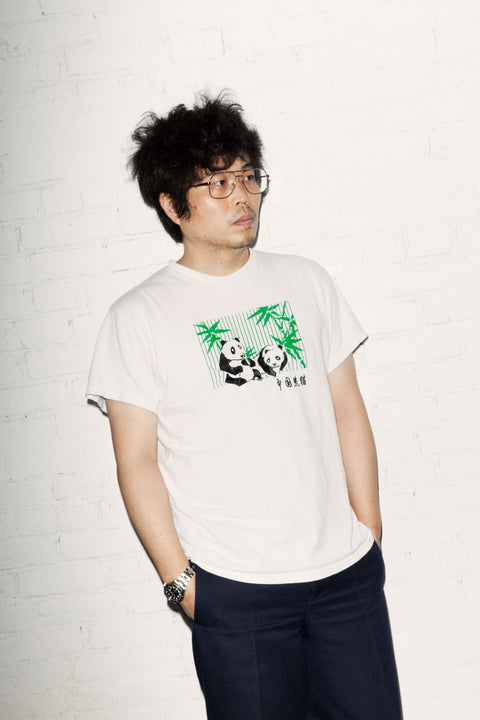
Fashion with Intention | RYUHEI OMARU 大丸隆平
From Design to Reality
Born in Fukuoka Japan to a family-owned woodshop, RYUHEI OMARU(大丸隆平)’s childhood was surrounded by craft. Determined to become a creator from an early age, he taught himself the basics of clothing making and enrolled into Bunka Fashion College in Tokyo. Upon graduation, he joined one of the most renowned fashion labels in Japan participating in Paris Fashion Week.
In 2006, Oomaru relocated to New York where he supported various designers with creative consulting and patternmaking services. In 2008, he established Oomaru Seisakusho 2, a product development studio named after his family’s woodshop, in the hopes of creating a new environment that merges Japanese virtues with innovative ideas. Oomaru Seisakusho 2 was granted the CFDA Fashion Manufacturing Initiative in 2015 and remains in-demand for its attention to detail and craftsmanship.
In 2015, Oomaru launched Overcoat, a unisex brand with the concept of “wearing New York”. His first collection comprised of coats made with the same material used for storefront awnings that inspired Oomaru during his walks throughout New York. In 2022, he opened Overcoat Tokyo, a concept store that carries the full collection with an expanded product range from outerwear to shirts and trousers.
 Dolman Sleeve Overcoat
Dolman Sleeve Overcoat
IROHA: What projects are you currently working on? What have you most recently completed or plan to do soon?
Ryuhei: Last Year, I presented a project called “Come Together” in collaboration with contemporary artist Rirkrit Tiravanija. We joined forces to create twelve wearable works of art with the purpose of giving new life to secondhand clothing.

OVERCOAT x Rirkrit Tiravanija COME TOGETHER In New York
For this project, we also partnered with The Or Foundation, a US and Ghana-based not-for-profit organization that has been working between two countries at the intersection of environmental justice, education and fashion development. What I learned is most of the donated clothing that pass-through Ghana’s secondhand market leaves the market as waste. I combined second-hand clothing provided by The Or Foundation with our signature Overcoat pieces using a shredding technique. We closed off a street in our neighborhood in Chinatown to exhibit these pieces to the public and participated in the Okayama Art Summit in Fall 2022. We hope to find other opportunities to exhibit the project worldwide.

OVERCOAT x Rirkrit Tiravanija COME TOGETHER In Okayama
IROHA: What are your thoughts regarding Asian hate and Asian glass ceiling issues?
Ryuhei: I came to New York with hardly any English skills and little knowledge about the way of living. I didn’t necessary feel any discrimination or hatred, but I did feel like a foreigner, for example, I wasn’t able to create a credit card making it difficult to look for housing. As I started to settle in New York, I came to realize how much respect there is towards Japanese creativity and craftsmanship. I appreciate what our predecessors have done, and I began to think about what we can do for our next generation in order to preserve our heritage in a diverse city like New York.
I find it interesting that while products created within our studio are labeled ‘made in New York’ the actual creators are all Japanese. I think there are ways to express and showcase Japanese craftsmanship without being physically in Japan, that is what I am trying to achieve through my studio.

Iconic awning material coats in 2016FW
IROHA: Based on your background, do you have any advice or a message for young people who want to follow in your footsteps?
Ryuhei: I relocated from Japan because I was offered a senior position at a New York based fashion label, but I ended up having trouble obtaining a visa. I decided to be self-dependent and shared a small apartment on the outskirts of Brooklyn with a couple of roommates in the industry. I started making my living by creating patterns for them. By word of mouth, my reputation quickly spread, and I was soon working with designers like Thom Browne and Alexander Wang. Although I couldn’t communicate in English fluently, I believe my work was my interpreter and I became confident in turning this opportunity into a business.

OVERCOAT Coat Collection
Iroha: Outside of work, what are you most interested in right now?
Ryuhei: I love playing Shogi, Japanese chess. During my childhood, I was a competitive player and was thinking of pursuing a professional career until my parents strongly opposed it. I started playing again when I came to New York. Shogi is played on a board composed of an 8 x 8 grid. Each player starts with 20 pieces, unlike Western chess, once players capture an opponent’s piece, they can use that piece as their own. The possible moves are almost astronomical but there is a cap. I sometimes feel like playing shogi and patternmaking are similar, your field is a grid, the possibilities are infinitive, when you make your move, you depend on both your experience and instincts.
